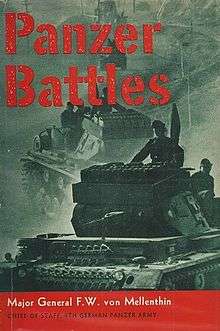Panzerschlachten

Panzerschlachten ("Panzer Battles") is the German language title of Major-General Friedrich W. von Mellenthin's autobiographical account of his service in the Panzer arm of the Wehrmacht Heer during World War II. The first English edition, as Panzer Battles: A Study of the Employment of Armor in the Second World War, was published in 1956 by University of Oklahoma Press.
The book gives details of the fluid nature of armoured warfare during the Second World War. It largely covers North African battles while also covering some engagements on the Eastern Front.
Criticism
The reliability of the book has been called into question over the years. Critics point out that Mellenthin tends to downplay German failures, while focusing exclusively on successes. Historians Ronald Smelser and Edward J. Davis have characterized Mellenthin's work as part of the "exculpatory memoirs" genre that feed the revisionist narrative, alongside books by Erich von Manstein, Heinz Guderian, Hans Rudel and Hans von Luck.[1] The historian Robert Citino notes the influential nature of Mellenthin's works in shaping the perceptions of the Red Army in the West as "a faceless and mindless horde" whose idea of military art was to "smash everything in its path through numbers, brute force and sheer size".[2]
Panzer Battles devotes a section to the "Physiology of the Russian Soldier":[3]
No one belonging to the cultural circles of the West is ever likely to fathom the character and soul of these Asiatics, born and bred on the other side of the European frontiers... The Russian is quite unpredictable. Perhaps the key to this attitude lies in the fact the Russian is not a conscious soldier, thinking on independent lines, but is a victim of moods which a Westerner cannot analyze.
Wehrmacht's adversaries on the Eastern Front are consistently depicted in racial terms in Panzer Battles:[4]
Russian soldiers' mental sluggishness makes them quite insensible to losses. The Russian soldier values his own life no more than that of his comrades... Life is not precious to him. He is immune to the most incredible hardships. The Russian soldier is essentially a primitive being. [...] He lacks any true religious or moral balance, and his moods alter between bestial cruelty and genuine kindness.
Known editions
- von Mellenthin, Major-General F. W. (1971) [1956]. Panzer Battles: A Study of the Employment of Armor in the Second World War (First Ballantine Books ed.). New York: Ballantine Books. ISBN 0-345-24440-0.
- von Mellenthin, Major-General F. W. (2011) [1956]. Bitwy pancerne Wehrmachtu (First Armagedon ed.). Gdynia: Armagedon. ISBN 978-83-932961-0-1.
See also
References
Citations
- ↑ Smelser & Davies 2008, p. 90.
- ↑ Citino 2012, pp. 204–205.
- ↑ Citino 2012, p. 205.
- ↑ Smelser & Davies II 2008, p. 111.
Bibliography
- Citino, Robert M. (2012). The Wehrmacht Retreats: Fighting a Lost War, 1943. Lawrence, KS: University Press of Kansas. ISBN 978-0-7006-1826-2.
- Smelser, Ronald; Davies II, Edward J. (2008). The myth of the Eastern Front: the Nazi-Soviet war in American popular culture. New York: Cambridge University Press. ISBN 9780521833653.